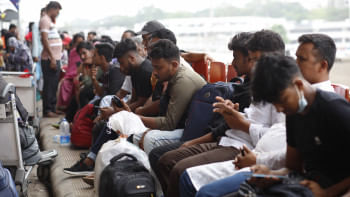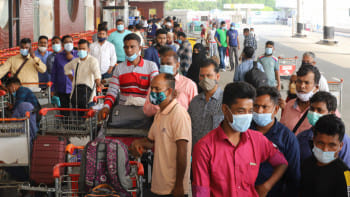Time to set a new benchmark for migrant welfare

Since taking over in early August, the interim government has taken a few positive steps to recognise the contributions of migrant workers and address their grievances. However, these isolated attempts fall far short of the comprehensive reforms needed across the labour migration process. As a result, feelings of neglect persist among the workers. This is why news of the record $24.24 billion in remittance earned up to November 2024 feels less like a triumph for migrants and more like a reminder of how the state continues to view them: as mere economic tools to boost its foreign reserves.
On the occasion of the International Migrants Day, The Daily Star talked to a number of migrant workers who expressed frustration over the lack of measures to ensure their welfare. One worker said, "They (Bangladesh authorities) don't care about how we live, our health issues, or whether we are safe. Their only concern is how much money we send." Even the embassies, he added, "do not respect us; they treat us like slaves." Such sentiments are rooted in years of systemic corruption, irregularities and mismanagement suffered by migrants. Reports of fraudulent recruitment practices and exorbitant migration costs remain alarmingly common. Once abroad, workers also face abuse, contract violations, and poor living conditions, with little recourse or support from the authorities.
The interim government has a chance to change this narrative and ensure that our workers receive the support they deserve. There are many issues that need to be fixed, from recruitment to reintegration. While the need for increasing remittances—through upskilling workers and deterring the reliance on informal channels such as hundi—is understandable, it is secondary to tackling the exploitative practices that plague the life cycle of migrant workers, directly affecting their wellbeing. The time has come to shift the focus from what migrants can do for the country to what the country can do for them. The formation of a commission to undertake this task, as recommended by experts, is an essential first step in that direction.
One area that needs urgent attention is the costs of migration. It is unacceptable that Bangladesh remains one of the costliest countries for migration, with aspiring workers often paying up to six times the government-stipulated costs due to corrupt practices and intermediaries. Moreover, they are also harassed while getting a passport, completing medical check-ups, etc. Clearly, stricter oversight of recruitment practices is crucial. The plight of workers stranded or mistreated abroad is another pressing concern. From Malaysia to the Gulf states, thousands face exploitative conditions, delayed salaries, and even threats of deportation. The government must enforce stricter monitoring of our recruitment agencies and embassies, and negotiate better protections with destination countries. Additionally, it must ensure proper reintegration for returning migrants who often struggle to rebuild their lives after years abroad.
There is a lot that needs to change, and for that, all relevant departments and agencies must undergo a cultural and operational overhaul. The interim government, and any administration that follows, must understand that we cannot honour the contributions of our migrant workers without a full recognition of their rights and dignity.


 For all latest news, follow The Daily Star's Google News channel.
For all latest news, follow The Daily Star's Google News channel. 











Comments